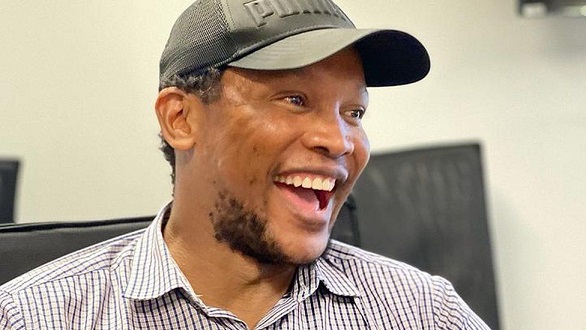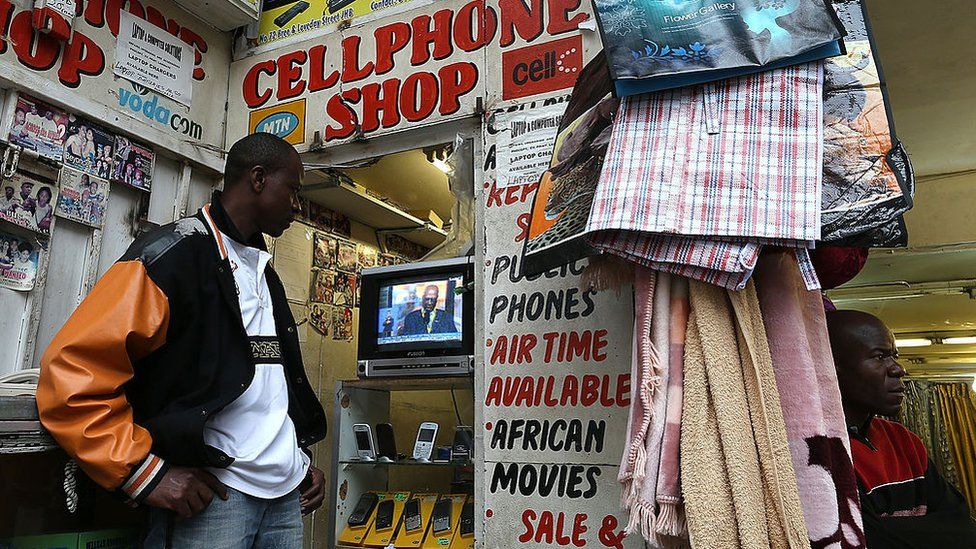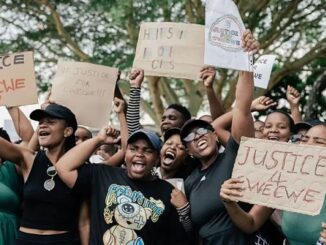
South African Nkosana Makate’s 14-year court battle against a huge corporate opponent is testimony to the idea that it is sometimes worth fighting on, as he is now in line for a pay-out worth millions of dollars, writes the BBC’s Pumza Fihlani in Johannesburg.
Mr Makate chooses his words carefully as if the years of working with lawyers has rubbed off on him.
But it may also be because the 45-year-old is shy and unassuming. It is not immediately obvious that this is a man who was determined to take on corporate might, and is now being hailed by some as an everyman hero.
Although his long legal struggle with mobile telecoms giant Vodacom has made him famous, it is publicity he would rather not have had.
But when he felt that he had not been properly compensated for an idea of his that made the company millions of dollars, he refused to be silent.
Two decades ago, he came up with the concept that went on to become Vodacom’s Please Call Me texting service, which allows customers to send a free message to another user on the same network requesting to be called back.

Despite various attempts to settle the case he ploughed on.
“Patience, loyalty and being fair in all my dealings rank very high in my world, I live by those values,” he told the BBC.
His casual jeans and plaid shirt belied a seriousness and business-like manner.
One of his most cherished gifts is a print of If, a poem by Rudyard Kipling, given to him by his mother when he turned 21.
An ode to resilience and level-headedness, the words have been the foundation of his adult life.
When the subject of family comes up a warm smile crosses his face betraying Mr Makate’s matter-of-fact manner.
It was, after all, his wife Rebecca, his girlfriend at the time, who was the inspiration for the Please Call Me concept.
‘I was told I was greedy’
Twenty-two years ago Mr Makate was working as a trainee in Vodacom’s finance department.
“Rebecca was a student at Fort Hare University and we were in a long-distance relationship. There’d be times where she’d want to call me but didn’t have airtime [credit to call].
“I thought: ‘Wouldn’t it be great if there was a way to initiate a call even when you didn’t have airtime?’ That’s how the idea came about,” he beamed, reliving the moment.
He entered into a verbal agreement with the company’s then director of product development and management, Philip Geissler, that he would get a share of the revenue generated by the product once it went to market.
At the time the firm even shared an internal newsletter praising him for the concept.
But something changed at some point and it is not clear why.
“Suddenly I was told that I’m being greedy for wanting a share of the profits from what I created,” said Mr Makate.
Instead of accepting the situation and deciding it was not worth taking on Vodacom, he went to court in 2008.
His team of experts estimate that Vodacom made at least $4.7bn (£3.4bn) from Please Call Me and he has not seen a cent of those profits. Mr Makate has been asking for 15% of that.
At first, the company denied that their ex-employee had come up with the idea and then they said he was not due any financial benefits from it.
The case has gone through a number of courts
Eventually, in 2016, it ended up in the highest court, the Constitutional Court, which found in Mr Makate’s favour and ordered the two sides to negotiate remuneration.
The company offered a settlement of $3.1m saying it was “overly generous”, but he rejected it.
Spirit of Kipling
“For me it’s about what is right, what is fair and it’s about justice. What they are doing is wrong and I cannot allow that,” he said explaining how he turned his back on an offer that would have made him a very rich man.
“The figure they offered really makes no sense because it was nowhere near what was owed.
“I’m happy we persisted with the court review because we have now been vindicated,” he said.
Earlier this month, High Court judge Wendy Hughes said that Vodacom had gone against the Constitutional Court ruling and negotiated in bad faith.
Judge Hughes also said he was entitled to a much bigger share of the revenue, which could run into the tens, if not hundreds, of millions of dollars.
Vodacom has been ordered to come back with a new figure. It has said it will appeal against the decision, adding that it had negotiated in good faith.
But for Mr Makate this is just another stage in a drawn-out legal battle that, he believes, has been designed to “outlast him” and force him to give up his claim.
“That is not going to happen. I will not give up,” he said, channelling the spirit of Kipling.
But there is something else, something more dear to him that is pushing him on. He wants to make his children proud.
“I hope they know that daddy fought a clean good fight and that they learn to stand for something in life. I also hope they learn that nothing worthy comes easy.”
Source: bbc.co.uk






Be the first to comment